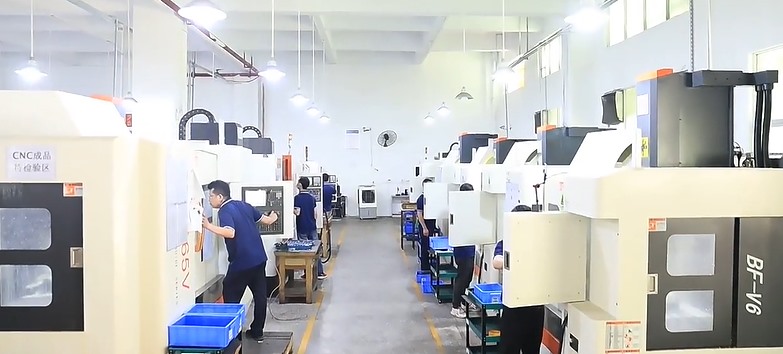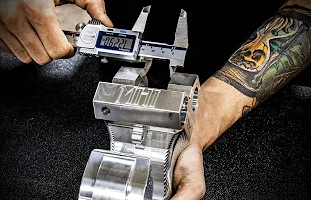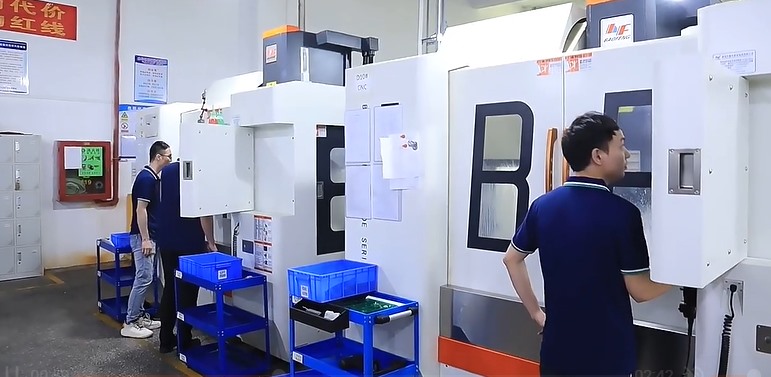CNC Production Machining Guide | 5 Things to Outsource Production
 Sep 22,2023
Sep 22,2023

In the dynamic world of manufacturing, CNC (Computer Numerical Control) production machining stands as a beacon of innovation, precision, and efficiency. This comprehensive guide delves into the critical aspects of CNC machining, contrasting it with traditional methods, exploring its myriad applications, and dissecting its advantages and disadvantages. Additionally, we offer insights into the strategic outsourcing of CNC production and answer some frequently asked questions, providing a thorough understanding for enthusiasts and professionals alike.
Why CNC Production Machining is Essential
CNC production machining has revolutionized the manufacturing industry by providing unparalleled precision, efficiency, and versatility. In this section, we explore the key reasons behind its indispensability in industrial production.
How to Increase CNC Production
Increasing CNC production involves optimizing machining processes, leveraging advanced software, and ensuring regular maintenance of equipment. Automation and AI integration lead to more efficient production cycles, reducing human error and increasing throughput.

Materials Compatible with CNC Machining
CNC machines handle a diverse range of materials, each presenting unique benefits and challenges in terms of machinability, cost, and final application. The selection of the right material depends on various factors, including the intended use of the part, desired properties, and budget constraints.
CNC Production Machining vs CNC Machining
Understanding the differences between CNC production machining and standard CNC machining is crucial for businesses to choose the right approach for their production needs. Each has its unique features, benefits, and considerations.
| Factor | High-Volume CNC Machining | General CNC Machining |
|---|---|---|
| Production Scale | Large-scale production | Small to medium-scale |
| Cost Per Unit | Lower in large quantities | Higher in small quantities |
| Flexibility | Limited flexibility | High flexibility |
| Setup Time and Cost | Higher initially | Lower |
| Customization | Less feasible | Highly feasible |
| Quality Control | Advanced systems | Standard systems |
Different Types of CNC Production Machining
Understanding the various types of CNC production machining is essential for selecting the appropriate approach for each project. This part of the guide categorizes and explains different types, focusing on their specific applications and advantages.
Low Volume CNC Machining
Ideal for custom projects or prototypes, low volume machining offers flexibility and cost-effectiveness for small batches.
High Volume Production Machining
This approach suits mass production needs, emphasizing speed, consistency, and reducing per-unit costs.
Custom or Prototype CNC Machining
Catering to unique designs and prototypes, custom machining allows for innovation in design and materials.
What is CNC Production Machining Used For
CNC machining finds applications in various industries, producing components with high precision. This section provides insight into its diverse uses, from aerospace to medical sectors, emphasizing its versatility and adaptability.
Aerospace, Automotive, Medical, and More
Examples include aerospace engine components, automotive transmission parts, and surgical tools in the medical field, each demanding specific tolerances and finishes.
Beyond the Mainstream Industries
Expanding on applications, we explore less-known uses of CNC machining, like in art installations, architectural models, or custom furniture making.
Advantages and Disadvantages of CNC Production Machining
While CNC machining offers numerous benefits, it also has limitations. This analysis presents a balanced view, discussing both the advantages and disadvantages to give a realistic understanding of CNC machining's potential and constraints.
Advantages of CNC Production Machining
Economies of Scale
Producing parts in batches can reduce the overall production cost per unit, especially for larger batches.
Consistency and Quality Control
Batch production allows for consistent quality across all parts in the batch, ensuring uniformity in production.
Optimized Machine Usage
By running a batch continuously, machine idle time is reduced, maximizing the utilization of CNC equipment.
Flexibility in Production Planning
Batch machining allows manufacturers to plan and adjust production schedules efficiently, accommodating different orders and priorities.
Reduced Setup Time
Setting up the CNC machine for a batch production reduces the frequency of setup times, contributing to overall time efficiency.
Disadvantages of Batch CNC Machining
Inventory Management Challenges
Batch production might result in excess inventory, requiring adequate storage and potentially leading to increased costs.
Less Flexibility for Customization
Once a batch production is set, making changes for customization can be challenging and costly.
Potential for Wastage
If defects are detected, the entire batch might be affected, leading to potential wastage.
Capital Lockup in Inventory
Large batch production requires significant investment in materials, which can lock up capital in inventory.
Longer Lead Times for Initial Batch
The first batch might have longer lead times as the setup and adjustments are made to ensure quality and efficiency.
Balancing the Trade-offs: Batch vs. Continuous CNC Machining
Businesses must balance the trade-offs of CNC machining, such as offsetting high initial investments with long-term savings in labor and materials.
| Factor | Batch CNC Machining | Continuous CNC Machining |
|---|---|---|
| Production Cost | Lower per unit in larger batches | Consistent regardless of batch size |
| Quality Control | High, but depends on batch consistency | Continuous monitoring, potentially higher consistency |
| Flexibility | Limited during a batch run | Higher for varied, continuous production |
| Setup Time | Less frequent, but potentially longer | More frequent, but shorter per setup |
| Inventory Management | More challenging | Easier with continuous flow |

Must Know 5 Things to Outsource Production CNC Machining
Outsourcing CNC machining involves considerations like cost-effectiveness, expertise of the service provider, quality assurance, turnaround time, and communication. This section guides readers through making informed decisions in their outsourcing ventures.
Outsourcing CNC machining can be a strategic decision that significantly impacts the quality, efficiency, and cost-effectiveness of your production. When considering outsourcing, it's vital to evaluate several key factors to ensure you're making an informed decision. Here, we present the top five considerations, formatted for clarity and enhanced understanding:
1. Cost-Effectiveness
Analysis Table:
| Factor | In-House Production | Outsourcing |
|---|---|---|
| Initial Investment | High (equipment, training) | Low |
| Operational Costs | Variable (depends on scale) | Fixed (per project basis) |
| Scalability | Limited by resources | High flexibility |
Key Consideration: Assess the long-term financial implications of both options, taking into account your production volume and scaling needs.
2. Expertise of the Service Provider
-
Checklist for Evaluation:
- Technical expertise and certifications
- Portfolio of previous work
- Client testimonials and reviews
-
Key Consideration: Ensure the provider has a proven track record in CNC machining, particularly in projects similar to yours.
3. Quality Assurance
-
Graphical Representation: Flowchart showing the quality control process of a potential outsourcing partner.
-
Key Consideration: Verify that the partner adheres to industry standards and has robust quality control measures in place.
4. Turnaround Time
Comparative Chart:
| Project Size | In-House Completion Time | Outsourced Completion Time |
|---|---|---|
| Small | X days/weeks | Y days/weeks |
| Medium | X days/weeks | Y days/weeks |
| Large | X days/weeks | Y days/weeks |
Key Consideration: Consider the time efficiency of outsourcing versus in-house production, especially for time-sensitive projects.
5. Communication and Support
-
Key Elements to Evaluate:
Responsive communication channels
- Availability of technical support
- Transparency in progress updates
-
Key Consideration: Effective communication is crucial for project success, particularly when adjustments or troubleshooting are needed.

Case Studies: Real-Life Examples of CNC Production Success
Industry needs many steps CNC production machining processes because every job need togo for final dimensions without any milling and lathe operation that is why each industrial sector has its own design of CNC machine.
Robotics Industry
It need cnc milling products with tight tolerance and precision because they have application in places where fits are the requirement and need for automatic robotic operation. For example radiation or chemical dangerous gaseous operative robot work with tight tolerance of handling different equipments of flask,jars and buckets.
Aerospace Industry
Fine polishing and machining surface is the need for these types of products, consider an example of engine blade of aeroplane or drone which has special surface morphology to flow the air in particular direction.
Automotive Industry
Engine blocks and piston surface need special cnc machining surface of Alumnium because rough surface can damage the flow and engine efficiency of drive operation of vehicle in case of full engine power.
Medical Devices Industry
Surgical items and routine operation tools need special machining surface of few microns roughness because rough surface tool can cause either damage in human organ or skin of sensitive body part.
Industrial Machinery
Industrial machinery of pump, rotors and chemical processing plants need special roughness of surface to counter the fluid flow turbulence effect and convert it into the laminar flow to make it in uniform working.
How to Custom CNC Production Services by Tuofa
We discuss how Tuofa, a leader in the field, customizes CNC production services to meet specific client needs, illustrating the process from initial consultation to final delivery, including case studies and success stories.
CNC production companies can offer machining services to general client because in this way low cost workshops can complete their jobs without further delay, but to select proper engineering company you have to study its qualification criteria and certification of international body. Tuofa China has:
ISO 9001 certification with trained machining manpower to handle 3d machining and tight tolerance.
It can achieve tolerance of less than 0.01 mm tolerance without any quality compromise and machining defect.
Latest CAD/CAM Softwares to convert designer 3d model into machining volume of particular job.
For more information, please send the part drawings to info@tuofa-cncmachining.com
FAQs about CNC Production Machining
Addressing common inquiries, this section demystifies CNC production machining, providing clear, concise answers to the most frequently asked questions, and offering tips for optimizing designs for CNC production.
What does aCNC Production Specialist Do?
Specialist can arrange production machining design in such away that one batch of job can undergo in Milling, Lathe and Turning process in one go with need of tolerance and precision.
 Tel/WeChat:
Tel/WeChat:  Email:
Email: 
 Home
Home
 10 Methods for Removal Chrome Plating
10 Methods for Removal Chrome Plating 







